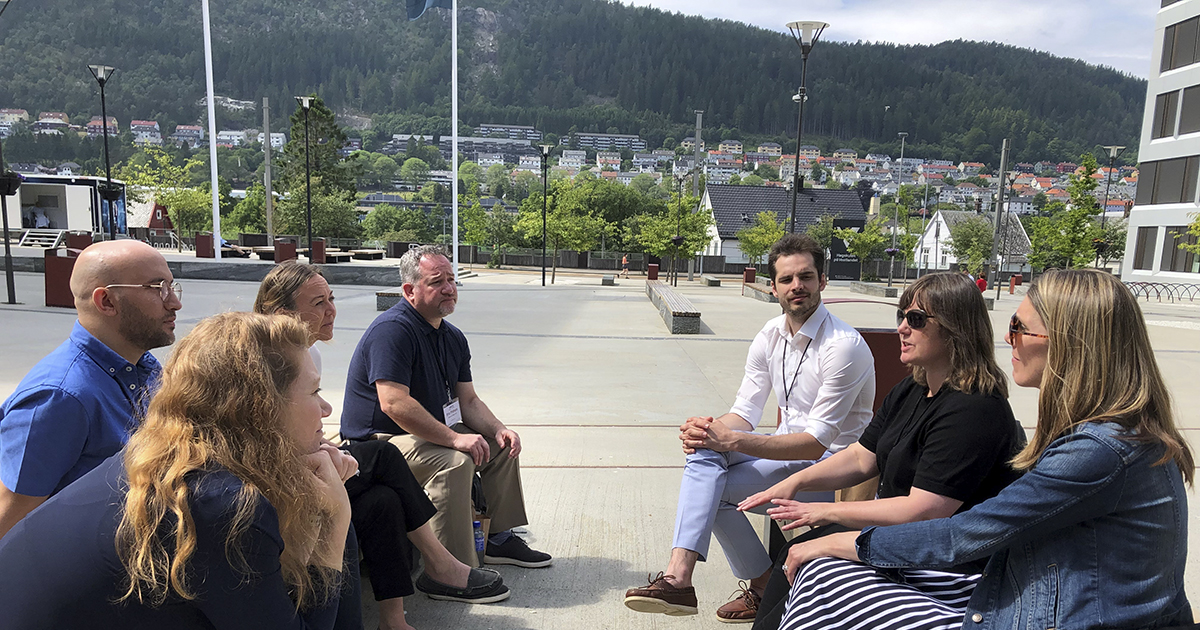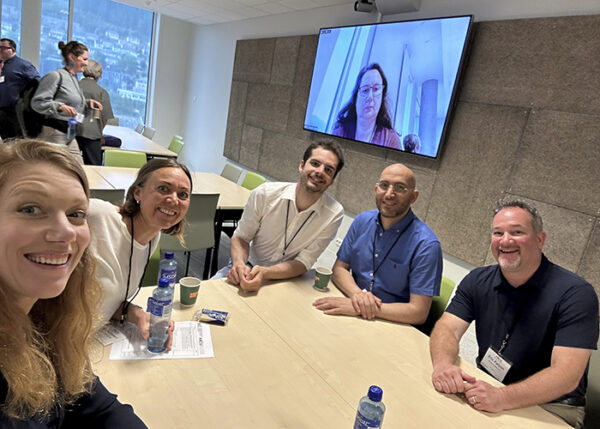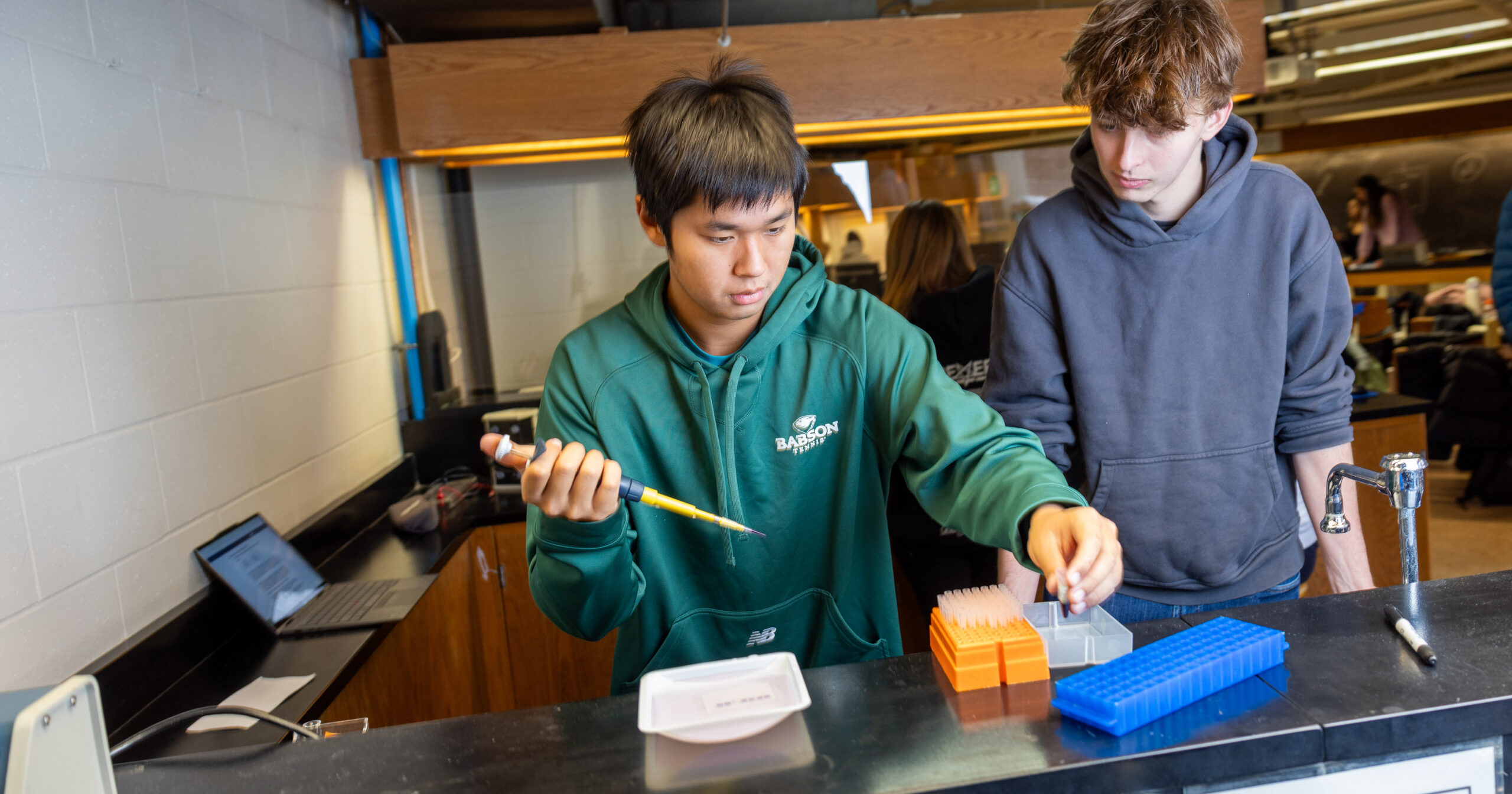New Class Cultivates International Business Skills Virtually

Ask most students with business experience to name the most difficult aspect of doing business with a global team and you’ll usually get the same answer—time zone differences.
Kristen Getchell, who teaches business communication at Babson College, said there are many other subtle differences that can be pivotal for business leaders seeking to create a successful global team in an increasingly virtual world.
“A lot of students don’t have these kinds of experiences, so they need to interact with colleagues internationally and see how to build teams with people across different countries, different languages, and different cultures,” Getchell, an associate professor, said.
To provide that exposure, Babson has partnered with Nord University to take part in the American Association of Colleges and Universities institute (AAC&U) virtual exchange/collaborative online international learning (VE-COIL), sponsored by the Norwegian government.
The program will immerse students in intercultural collaboration, connecting them with their peers in Norway and preparing them for an increasingly globalized economy, said Amir Reza, Dean of the Babson Academy of Global Entrepreneurial Learning and of Global Education.
“The world of work that our graduates will enter will require these types of skills,” Reza said. “Many assume that these are ‘soft skills,’ when in fact they’re essential. More and more work is done with people across the world in these sorts of virtual formats or teams.”
The virtual access means students who might not be able to travel due to cost, time constraints or ongoing COVID-19 restrictions, can experience team building with other cultures.
“There’s a whole area of both research and progress being made on the concept of cooperative online international learning, which has multiple benefits,” Reza said. One of the biggest benefits, he adds, is that it, “enriches all students with a global learning experience without mobility. Previously, this was primarily done through education abroad programs.”
Building Connections
Reda Hemdan Hassan, a PhD research fellow at Nord University Business School who will help teach the course, said the different methods of team building and collaboration in Norway are quite stark.
“I think we’re going to benefit from this collaboration even more than Babson, mainly because our Nord students tend to be quieter. They don’t really get involved in the class as much as American students, they listen more than they talk,” Hassan said. “So, I’m really interested in seeing how they will interact with Americans. We will get a lot of benefits not only through access to a new environment, but also access to a completely different culture and different experiences when communicating with people.”

Faculty from Babson College and Nord University met in Norway to work on a Virtual Exchange course available to students in the spring semester.
The class, which starts in the spring semester, will combine master’s students from Babson and Nord University. They’ll collaborate virtually, breaking up into groups of six with three team members from each institution. They’ll spend the first few weeks learning about each other and cultivating personal connections, then they’ll start a six-week project involving a real business issue that the international teams must address.
Getchell, Reza, Babson’s Senior Director of Academic Technologies Eric Palson MBA’09, Senior Director of International Education Lorien Romito and others working on the virtual exchange course traveled to Bergen, Norway, in June to meet Hassan and other Norwegian counterparts while finalizing lesson plans for the online course.
“The trip really helped us connect and work together,” Palson said. “It also underscored some of the things that we’ll talk about in the class, in the sense that it’s so important to build a connection, and any way we can connect the students on a personal level before they jump into the project is really a critical component to the success of this program as we see it.”
Virtual Expansion
The partnership between Babson and Nord is one of nine international VE-COIL partnerships involving 19 institutions from the U.S., Norway, and Japan. Facilitators started meeting in March to create the program, which involves co-teaching multicultural online coursework.
“The world of work that our graduates will enter will require these types of skills. Many assume that these are ‘soft skills,’ when in fact they’re essential. More and more work is done with people across the world in these sorts of virtual formats or teams.”
Amir Reza, Dean of the Babson Academy of Global Entrepreneurial Learning and of Global Education
Getchell and Palson based the class on an undergraduate course which also focused on virtual team building. Those students, who worked virtually with peers from the University of Southern California’s Marshall School of Business, have since boosted their credentials by including the virtual exchange experience on their resumes, Getchell said.
Palson is looking forward to the final project, where graduate students will be able to put their intercultural trust building to work.
“The project itself is going to be really exciting. I think it’s going to be something that will resonate and put the teams to the test,” Palson said. “It’s going to be important that they know how to work together, and that they can rely on one another and trust one another.”
And, as Getchell and Palson work through the new class, Babson administrators plan to work with them to create a guidebook to help other faculty members should they want to do something similar.
“International collaborative online learning is a really big part of the conversation in global learning right now, so I think we’ll only see more of this,” Romito said. “We have so many strong relationships with universities where we could do another course like this easily.”




